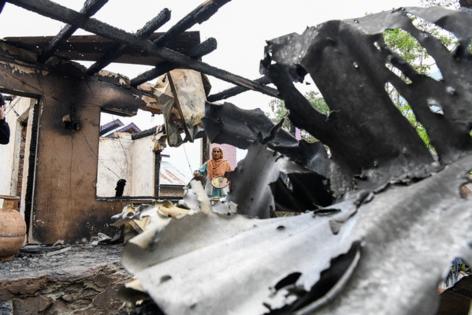India says it thwarts Pakistan airstrikes as tensions soar
Published in News & Features
India said it “neutralized” Pakistani drone and missile attacks targeting several military sites on Thursday night, marking an escalation in hostilities between the two nuclear-armed neighbors.
Military stations in the northern cities of Jammu, Pathankot and Udhampur near the border with Pakistan were targeted, India’s Ministry of Defence said Thursday in a post on X. “The threats were swiftly neutralized using kinetic and non-kinetic capabilities,” the ministry said, and no casualties were reported.
Pakistan’s government denied it had launched the attacks, saying the claims were “politically motivated.” Several unconfirmed videos were circulating on social media purporting to show the missile strikes. Varinder Jeet Singh, a senior leader with the ruling Bharatiya Janata Party in Jammu, said by phone he’d seen “flashes in the sky,” which were followed by a blackout in the city.
The military action marks a second day of hostilities between the two rival nations. India began the strikes on Wednesday on what it called terrorist targets in Pakistan in retaliation for an April 22 attack that killed 26 civilians in the India-controlled part of Kashmir region. The strikes on nine targets, which Pakistan’s army said killed 31 civilians, were the deepest breach of Pakistani territory since the 1971 war.
Pakistan said earlier Thursday it had shot down Indian drones, while India said it intercepted drones and missiles from Pakistan.
The escalation in hostilities has fueled concern of a worsening conflict between the two rival nations, which have fought wars in the past over the disputed region of Kashmir, a territory both countries claim in full but control in part.
Pakistan stocks plunged on Thursday, triggering a temporary trading halt, while India’s rupee had its biggest intra-day drop in three years.
Pakistan Defense Minister Khawaja Muhammad Asif said an attack on India was now a high probability. Pakistan’s decision to retaliate doesn’t depend on whether India strikes, he told ARY News channel.
On Wednesday, Pakistan said it shot down five Indian fighter jets, and Thursday said it intercepted several drones over densely populated cities like Lahore and Rawalpindi. The drones were Israeli-made Harop ones, according to the Pakistani army, so-called kamikaze drones that carry explosives to their targets and destroy themselves on detonation.
The U.S. and other major global powers have called for both sides to show restraint. President Donald Trump said on Wednesday that after the tit-for-tat strikes, “hopefully they can stop now.”
Vice President JD Vance, speaking in a Fox New interview Thursday, said “we want this thing to deescalate as quickly as possible.”
“What we can do is try to encourage these folks to deescalate a little bit, but we’re not going to get involved in the middle of a war that’s fundamentally none of our business and has nothing to do with America’s ability to control it,” he said. “The job of diplomacy, but also the job of cooler heads in India and Pakistan, is to make sure this doesn’t become a nuclear war.”
Earlier Thursday, Secretary of State Marco Rubio spoke with Pakistani Prime Minister Shehbaz Sharif and India’s External Affairs Minister Subrahmanyam Jaishankar, calling for a deescalation in the conflict. Rubio “expressed U.S. support for direct dialogue between India and Pakistan and encouraged continued efforts to improve communications,” his office said in a readout of the call with Jaishankar.
The last time the two sides came close to an all-out war was in 2019, after a suicide bomber killed 40 members of India’s security forces. India blamed Pakistan and responded about two weeks later with its first airstrikes on Pakistani soil since 1971. Pakistan retaliated by shooting down an Indian jet and arresting the pilot, who was later released. Tensions died down soon afterward.
_____
(With assistance from Swati Gupta, Faseeh Mangi, Saket Sundria and Hadriana Lowenkron.)
_____
©2025 Bloomberg L.P. Visit bloomberg.com. Distributed by Tribune Content Agency, LLC.







Comments